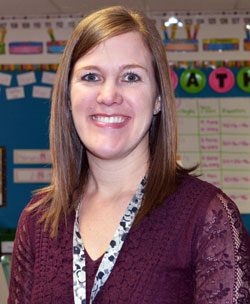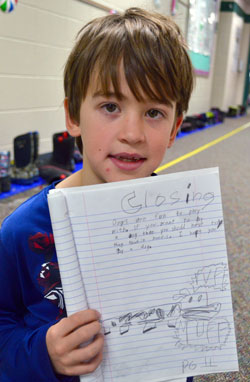Turns out, by second grade a person knows a lot about some things. So much that it could fill a book, even.
At East Oakview Elementary, teacher Danielle Stanley capitalized on students’ prior knowledge to have them do just that.

William Veldheer knows that deadly storms such as hurricanes and tornadoes can “break houses,” he wrote, and that sometimes “the house cannot be remade.”
Javion Burton’s book focused on guard dogs, and Sabrina Estes wrote about sharks.
Evan Yonkers doesn’t have a dog, “but my cousin does, so I know a lot about their dog,” he explained. His 11-page book includes information about what people need if they are going to own a dog, such as food, a bed and maybe a house if it’s going to be outside sometimes. And all that takes money.
“Dogs are expensive,” Evan said. “You can’t just get one for free; you have to pay for it.”
Zoe Cydzik’s book, titled “Cute Bunnys,” details where the furry animals live, what they eat, and even what eats them.
“If people put animals outside, that sometimes happens,” Zoe explained.

Practice As Goal
The goal of the book project was to give second-graders practice creating a table of contents and writing attention-getting introductions, use facts to develop the text and craft conclusions — all based on what they knew about a topic of their choosing. The project encompassed Common Core writing standards, and is taught by second grade teachers throughout the district, Stanley said.
“It was fun for me to watch them develop their introductions,” Stanley said. “Some students revised many times before they felt they came up with the perfect intro to grab their reader’s attention.”
The most challenging part for Zoe was putting together a table of contents, she said. For Evan, it was “figuring out what you’re going to have for your chapters, and writing the words.”
More practice is on the way. Next, students will use kid-friendly websites to research something that interests them, then create a book based on what they learn.
“We will also work on strengthening students’ writing by editing and revising as necessary, both of which fall under two more of our writing priority standards,” Stanley said.
“As with anything, we always have areas to work on and improve, and we will continue to work on the components of informational texts as we move into our research projects.”
CONNECT











